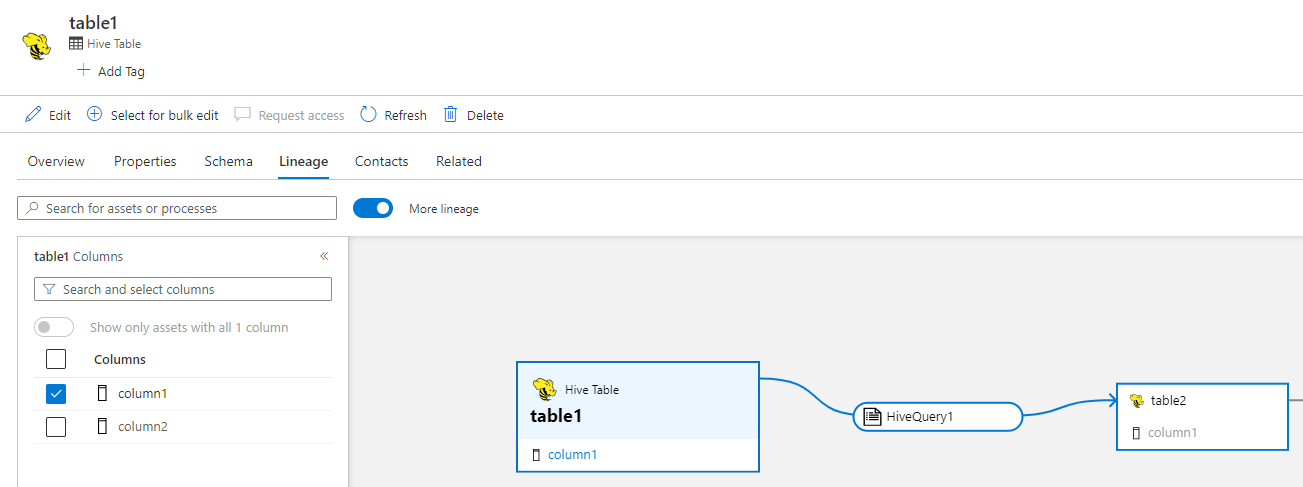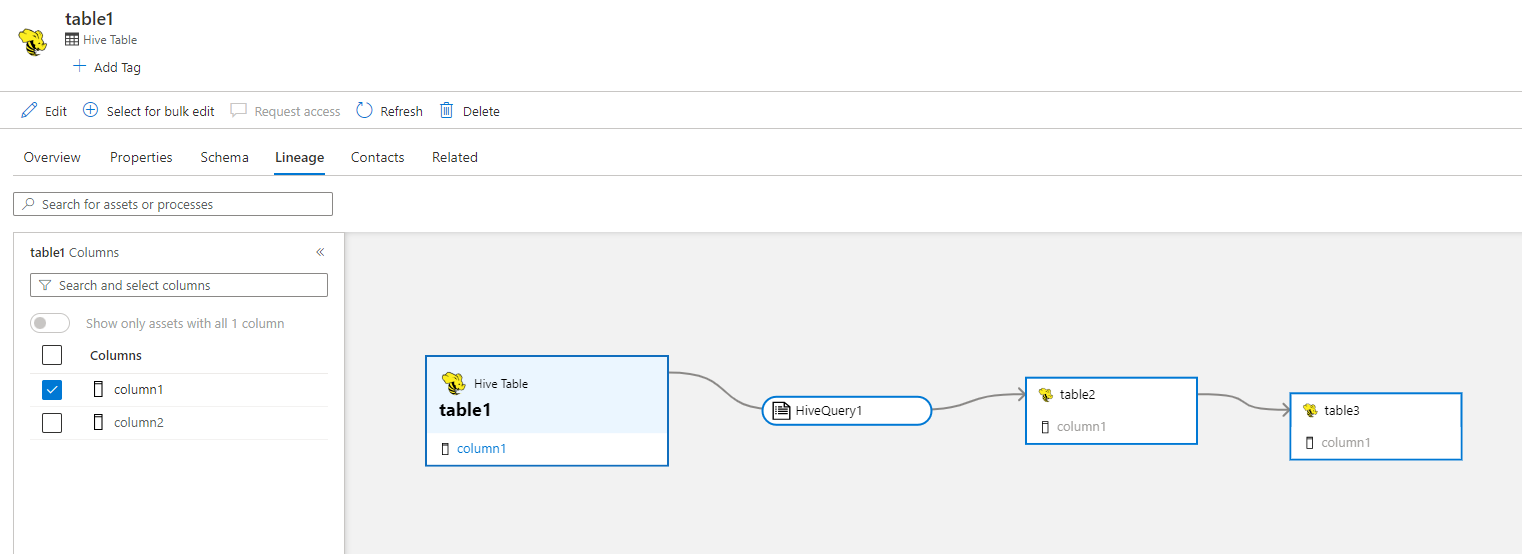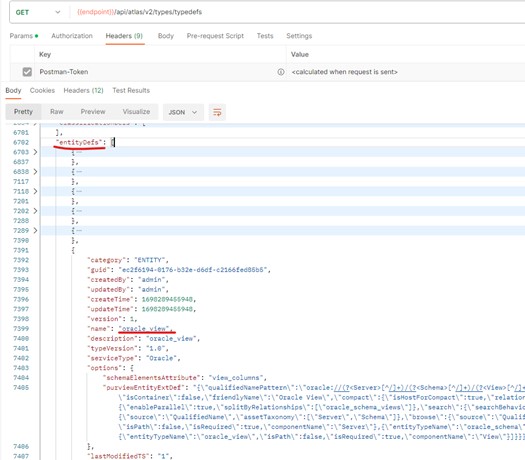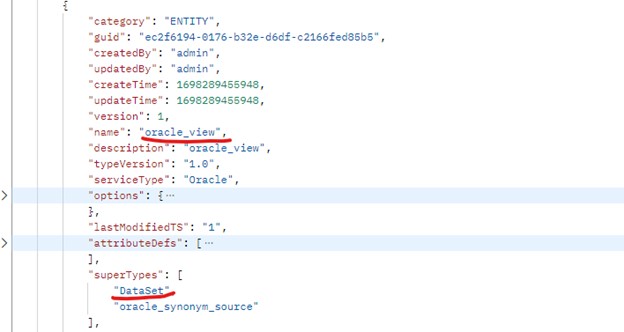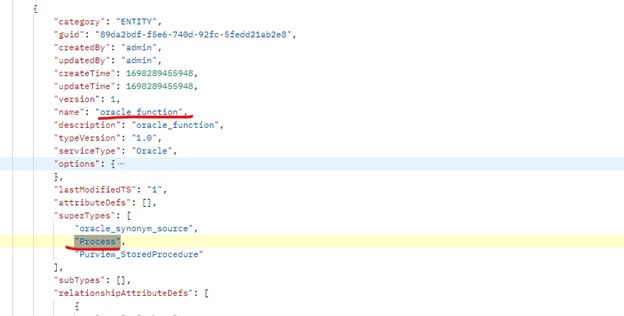本教程介绍如何使用 Purview REST API:
- 在数据资产之间创建资产和世系关系。
- 查询世系关系/路径。
本文中引用的 API:
先决条件
使用这些 API 需要 数据策展人和数据读取者角色。 有关如何获取访问令牌的详细信息,请查看 本教程 。
概念
资产
在 Purview 中,我们有两种类型的基本资产:数据集和过程。
- 包含 Azure SQL Table、Table 等数据的数据集资产应继承自 DataSet。
- 处理数据的流程资产(如数据管道、查询、函数等)应从 Process 继承。
请参阅 资产和类型 ,了解数据集和进程的类型定义。
关系和世系
在 Microsoft Purview 中,世系有三种类型的关系:
- dataset_process_inputs:将数据集连接到进程,这意味着数据集是进程的输入
- process_dataset_outputs:将进程连接到数据集,这意味着进程生成数据集
- direct_lineage_dataset_dataset:将 DataSet1 连接到 DataSet2,这意味着 DataSet1 是 DataSet2 的上游,尽管我们不知道它们之间的进程
示例 1:下面是一个沿袭示例,其中包含 2 个数据集、一个进程和两个世系关系:
数据集---> dataset_process_inputs ---> 处理---> process_dataset_outputs ---> 数据集
示例 2:具有 2 个数据集和一个世系关系的另一个世系示例:
数据集---> direct_lineage_dataset_dataset ---> 数据集
在数据资产之间创建资产和世系关系
在以下部分中,我们将hive_table作为 DataSet 的示例类型,hive_query_process作为 Process 的示例类型。 我们将使用这两种类型创建资产,并在它们之间创建世系。 可以使用继承自 DataSet 或 Process 的任何其他类型来创建世系。
示例 1
通过 API 创建资产
如果要为其创建世系的资产尚未在 Microsoft Purview 中创建,则可以调用以下 API 来创建这些资产。
API: 批量创建资产
任务:创建两个hive_tables作为数据集 - table1 和 table2,每个数据集具有 2 个hive_columns - column1 和 column2。
POST {endpoint}/datamap/api/atlas/v2/entity/bulk
使用正文:
{
"entities": [
{
"typeName": "hive_table",
"attributes": {
"qualifiedName": "test_lineage.table1",
"name": "table1"
},
"relationshipAttributes": {
"columns": [
{
"guid": "-11",
"typeName": "hive_column"
},{
"guid": "-12",
"typeName": "hive_column"
}
]
},
"guid": "-1"
},
{
"typeName": "hive_column",
"attributes": {
"qualifiedName": "test_lineage.table1#column1",
"name": "column1",
"type": "int"
},
"guid": "-11",
"relationshipAttributes": {
"table": {
"guid": "-1",
"typeName": "hive_table"
}
}
},
{
"typeName": "hive_column",
"attributes": {
"qualifiedName": "test_lineage.table1#column2",
"name": "column2",
"type": "int"
},
"guid": "-12",
"relationshipAttributes": {
"table": {
"guid": "-1",
"typeName": "hive_table"
}
}
},
{
"typeName": "hive_table",
"attributes": {
"qualifiedName": "test_lineage.table2",
"name": "table2"
},
"relationshipAttributes": {
"columns": [
{
"guid": "-21",
"typeName": "hive_column"
},{
"guid": "-22",
"typeName": "hive_column"
}
]
},
"guid": "-2"
},
{
"typeName": "hive_column",
"attributes": {
"qualifiedName": "test_lineage.table2#column1",
"name": "column1",
"type": "int"
},
"guid": "-21",
"relationshipAttributes": {
"table": {
"guid": "-2",
"typeName": "hive_table"
}
}
},
{
"typeName": "hive_column",
"attributes": {
"qualifiedName": "test_lineage.table2#column2",
"name": "column2",
"type": "int"
},
"guid": "-22",
"relationshipAttributes": {
"table": {
"guid": "-2",
"typeName": "hive_table"
}
}
}
]
}
任务:创建进程资产“hive_view_query”
POST {endpoint}/datamap/api/atlas/v2/entity/bulk
使用正文:
{
"entities": [
{
"typeName": "hive_view_query",
"attributes": {
"qualifiedName": "test_lineage.HiveQuery1",
"name": "HiveQuery1",
"columnMapping": "[{\"DatasetMapping\":{\"Source\":\"test_lineage.table1\",\"Sink\":\"test_lineage.table2\"},\"ColumnMapping\":[{\"Source\":\"column1\",\"Sink\":\"column1\"},{\"Source\":\"column2\",\"Sink\":\"column2\"}]}]"
},
"guid": "-1"
}
]
}
上述 API 调用会导致创建两个hive_tables (数据集) 和一个hive_view_query (进程) 。
在数据集和进程之间创建世系关系
API: 创建关系
任务:从表 1 创建世系 -> HiveQuery1 (即数据集 -> 处理)
POST {endpoint}/datamap/api/atlas/v2/relationship
使用正文:
{
"typeName": "dataset_process_inputs",
"guid": "-1",
"end1": {
"typeName": "hive_table",
"uniqueAttributes": {
"qualifiedName": "test_lineage.table1"
}
},
"end2": {
"typeName": "Process",
"uniqueAttributes": {
"qualifiedName": "test_lineage.HiveQuery1"
}
}
}
任务:从 HiveQuery1 -> table2 (即 Process -> Dataset)
POST {endpoint}/datamap/api/atlas/v2/relationship
使用正文:
{
"typeName": "process_dataset_outputs",
"guid": "-2",
"end1": {
"typeName": "Process",
"uniqueAttributes": {
"qualifiedName": "test_lineage.HiveQuery1"
}
},
"end2": {
"typeName": "hive_table",
"uniqueAttributes": {
"qualifiedName": "test_lineage.table2"
}
}
}
查看世系
创建资产和世系关系后,可以在 Microsoft Purview 中检查世系图:
示例 2
创建包含两列的 hive 表 table3
API: 批量创建资产
任务:创建表 3,包含 2 个hive_columns、column1 和 column2
POST {endpoint}/datamap/api/atlas/v2/entity/bulk
使用正文:
{
"entities": [
{
"typeName": "hive_table",
"attributes": {
"qualifiedName": "test_lineage.table3",
"name": "table3"
},
"relationshipAttributes": {
"columns": [
{
"guid": "-31",
"typeName": "hive_column"
},{
"guid": "-32",
"typeName": "hive_column"
}
]
},
"guid": "-3"
},
{
"typeName": "hive_column",
"attributes": {
"qualifiedName": "test_lineage.table3#column1",
"name": "column1",
"type": "int"
},
"guid": "-31",
"relationshipAttributes": {
"table": {
"guid": "-3",
"typeName": "hive_table"
}
}
},
{
"typeName": "hive_column",
"attributes": {
"qualifiedName": "test_lineage.table3#column2",
"name": "column2",
"type": "int"
},
"guid": "-32",
"relationshipAttributes": {
"table": {
"guid": "-3",
"typeName": "hive_table"
}
}
}
]
}
使用列映射在表 2 和表 3 之间创建直接世系
API: 创建关系
任务:使用列映射从表 2 -> table3 ((即数据集 -> 数据集) 创建世系)
POST {endpoint}/datamap/api/atlas/v2/relationship
使用正文:
{
"typeName": "direct_lineage_dataset_dataset",
"guid": "-1",
"end1": {
"typeName": "hive_table",
"uniqueAttributes": {
"qualifiedName": "test_lineage.table2"
}
},
"end2": {
"typeName": " hive_table ",
"uniqueAttributes": {
"qualifiedName": "test_lineage.table3"
}
},
"attributes": {
"columnMapping": "[{\"Source\":\"column1\",\"Sink\":\"column1\"},{\"Source\":\"column2\",\"Sink\":\"column2\"}]"
}
}
查看世系
现在,沿袭图 (上面的示例 1 & 示例 2) 变为:
请注意,table2 直接链接到 table3,它们之间没有 HiveQuery。
查询世系关系/路径
API: 通过 GUID 获取世系
任务:通过 REST API 获取表 2 的世系
GET {{endpoint}}/api/atlas/v2/lineage/{{guid_of_table2}}?direction=BOTH
可以在以下 JSON 响应有效负载:
{
"baseEntityGuid": "2a12b3ff-5816-4222-833a-035bf82e06e0",
"lineageDirection": "BOTH",
"lineageDepth": 3,
"lineageWidth": -1,
"childrenCount": -1,
"guidEntityMap": {
"16b93b78-8683-4f88-9651-24c4a9d797b0": {
"typeName": "hive_table",
"attributes": {
"temporary": false,
"lastAccessTime": 0,
"createTime": 0,
"qualifiedName": "test_lineage.table3",
"name": "table3",
"retention": 0
},
"lastModifiedTS": "1",
"guid": "16b93b78-8683-4f88-9651-24c4a9d797b0",
"status": "ACTIVE",
"displayText": "table3",
"classificationNames": [],
"meaningNames": [],
"meanings": [],
"isIncomplete": false,
"labels": [],
"isIndexed": true
},
"cb22ba23-47a2-4149-ade6-e3d9642fe592": {
"typeName": "hive_table",
"attributes": {
"temporary": false,
"lastAccessTime": 0,
"createTime": 0,
"qualifiedName": "test_lineage.table1",
"name": "table1",
"retention": 0
},
"lastModifiedTS": "1",
"guid": "cb22ba23-47a2-4149-ade6-e3d9642fe592",
"status": "ACTIVE",
"displayText": "table1",
"classificationNames": [],
"meaningNames": [],
"meanings": [],
"isIncomplete": false,
"labels": [],
"isIndexed": true
},
"bbeacce6-5bde-46f7-8fe4-689cbb36ba51": {
"typeName": "hive_view_query",
"attributes": {
"qualifiedName": "test_lineage.HiveQuery1",
"name": "HiveQuery1",
"columnMapping": "[{\"DatasetMapping\":{\"Source\":\"test_lineage.table1\",\"Sink\":\"test_lineage.table2\"},\"ColumnMapping\":[{\"Source\":\"column1\",\"Sink\":\"column1\"},{\"Source\":\"column2\",\"Sink\":\"column2\"}]}]"
},
"lastModifiedTS": "1",
"guid": "bbeacce6-5bde-46f7-8fe4-689cbb36ba51",
"status": "ACTIVE",
"displayText": "HiveQuery1",
"classificationNames": [],
"meaningNames": [],
"meanings": [],
"isIncomplete": false,
"labels": [],
"isIndexed": true
},
"2a12b3ff-5816-4222-833a-035bf82e06e0": {
"typeName": "hive_table",
"attributes": {
"temporary": false,
"lastAccessTime": 0,
"createTime": 0,
"qualifiedName": "test_lineage.table2",
"name": "table2",
"retention": 0
},
"lastModifiedTS": "1",
"guid": "2a12b3ff-5816-4222-833a-035bf82e06e0",
"status": "ACTIVE",
"displayText": "table2",
"classificationNames": [],
"meaningNames": [],
"meanings": [],
"isIncomplete": false,
"labels": [],
"isIndexed": true
}
},
"includeParent": false,
"relations": [
{
"fromEntityId": "2a12b3ff-5816-4222-833a-035bf82e06e0",
"toEntityId": "16b93b78-8683-4f88-9651-24c4a9d797b0",
"relationshipId": "23df8e3e-b066-40b2-be29-9fd90693c51b",
"columnMapping": "[{\"Source\":\"column1\",\"Sink\":\"column1\"},{\"Source\":\"column2\",\"Sink\":\"column2\"}]"
},
{
"fromEntityId": "bbeacce6-5bde-46f7-8fe4-689cbb36ba51",
"toEntityId": "2a12b3ff-5816-4222-833a-035bf82e06e0",
"relationshipId": "5fe8d378-39cd-4c6b-8ced-91b0152d3014"
},
{
"fromEntityId": "cb22ba23-47a2-4149-ade6-e3d9642fe592",
"toEntityId": "bbeacce6-5bde-46f7-8fe4-689cbb36ba51",
"relationshipId": "73e084bf-98a3-45fb-a1e4-c56cc40661b8"
}
],
"parentRelations": [],
"widthCounts": {
"INPUT": {
"cb22ba23-47a2-4149-ade6-e3d9642fe592": 0,
"bbeacce6-5bde-46f7-8fe4-689cbb36ba51": 1,
"2a12b3ff-5816-4222-833a-035bf82e06e0": 1
},
"OUTPUT": {
"16b93b78-8683-4f88-9651-24c4a9d797b0": 0,
"2a12b3ff-5816-4222-833a-035bf82e06e0": 1
}
}
}
其他资源
类型定义
所有资产/实体和关系都在类型系统中定义。
调用 列出所有类型定义 API,以获取 Microsoft Purview 实例中的当前类型定义。 如果不确定在所述的 API 调用中使用哪个 typeName,可以检查类型定义 API 来查找相应的资产/实体类型。
下面是此 API 的示例响应:
可以看到,在上述响应的 entityDefs 中,定义了资产类型。 进一步了解资产的定义,发现资产是继承的数据集类型。
同样,可以发现过程继承自“过程”类型,如下所示:
创建新的自定义类型
如果要创建自定义资产或进程,可以使用以下 API。
API: 创建 Typedef API
任务:创建自定义进程类型
POST {endpoint}/datamap/api/atlas/v2/types/typedefs
使用正文:
{
"enumDefs": [],
"structDefs": [],
"classificationDefs": [],
"entityDefs": [
{
"name": "MyCustomServiceProcess",
"superTypes": [
"Process"
],
"typeVersion": "1.0",
"attributeDefs": []
}
],
"relationshipDefs": []
}
任务:创建自定义数据集类型
POST {endpoint}/datamap/api/atlas/v2/types/typedefs
使用正文:
{
"enumDefs": [],
"structDefs": [],
"classificationDefs": [],
"entityDefs": [
{
"name": "MyCustomDataSet",
"superTypes": [
"DataSet"
],
"typeVersion": "1.0",
"attributeDefs": []
}
],
"relationshipDefs": []
}


